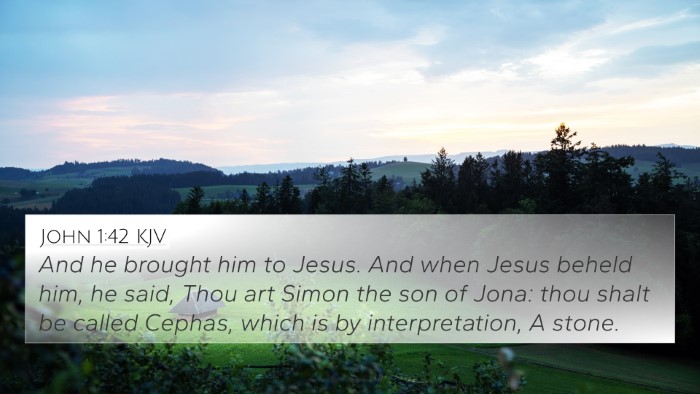Understanding Acts 10:5
Acts 10:5 is a pivotal verse in the New Testament, marking the beginning of a significant turning point in the early Christian church. This verse states:
"And now send men to Joppa, and call for one Simon, whose surname is Peter."
This simple command leads to profound revelations about the inclusion of the Gentiles in the Christian faith. Below, we explore the meaning of this verse, drawing from insights provided by public domain commentaries.
Thematic Insights
The themes that emerge from Acts 10:5 include obedience to divine direction, the breaking down of barriers between Jews and Gentiles, and the pivotal role of Peter in the early Church. The following summaries provide depth to these themes:
-
Divine Direction:
Matthew Henry notes the importance of God speaking to Cornelius, indicating divine initiative in the salvation of Gentiles. The instruction given to send for Peter emphasizes the importance of seeking guidance and obedience to God's call.
-
Inclusion of the Gentiles:
Albert Barnes emphasizes that Peter’s involvement signals God's plan to widen the scope of salvation. This indicates a crucial shift in the early Church's understanding of mission.
-
Peters Role:
Adam Clarke points out that Peter's mission to Joppa represents Jesus’ broader calling to the apostles to go beyond Israel and reach 'all nations.' This aligns with the Great Commission found in Matthew 28:19.
Bible Verse Cross-References
Acts 10:5 connects with various Bible verses, enriching our understanding and interpretation. Here are some significant cross-references:
- Matthew 28:19-20: The Great Commission, which instructs the apostles to make disciples of all nations.
- Luke 3:6: "And all flesh shall see the salvation of God," foreshadowing the inclusion of Gentiles.
- Acts 2:39: Peter’s sermon at Pentecost discusses how the promise of salvation extends to all nations.
- Isaiah 49:6: "I will also give you as a light to the Gentiles...", prophesying the role of Israel in evangelism.
- Romans 1:16: Paul reflects on the gospel being for everyone, Jew and Gentile alike, underscoring the message of acceptance.
- Galatians 3:28: “There is neither Jew nor Greek,” emphasizing unity in Christ regardless of background.
- John 10:16: Jesus talks about having "other sheep," indicating that His mission extends beyond Israel.
Comparative Bible Verse Analysis
In analyzing Acts 10:5, we can observe the connections and contrasts between Old and New Testament teachings:
-
Old Testament Prophecies:
Many prophecies highlight the future inclusion of the Gentiles, such as Isaiah 60:3, which states that nations shall walk in the light of God's people.
-
New Testament Fulfillment:
Acts 10 illustrates the fulfillment of these prophecies through Peter’s ministry, identifying the practical application of these Old Testament promises.
Linking Bible Scriptures
Acts 10:5 acts as a bridge in the larger narrative of the Book of Acts. It connects to the broader themes of divine intervention and missionary work, evident elsewhere in the scriptures.
- Acts 8:4: The early church’s mission leads to the spread of the gospel beyond Jerusalem.
- Acts 10:34-35: Peter realizes God shows no favoritism, resonating with the message in Acts 10:5.
Conclusion
Acts 10:5 encapsulates a transformative moment in Christian history. This verse underscores the breaking down of barriers between diverse groups, illustrating God's heart for all nations. By examining this verse alongside others, we can appreciate the interconnectedness of scripture and the overarching theme of inclusion within the church.
Utilizing tools for Bible cross-referencing can enhance our understanding of how these verses relate to one another, providing valuable insights for personal study, sermon preparation, and inter-Biblical dialogue.
Further Study Resources
- Bible Concordance: An essential tool for finding specific verses and their connections.
- Bible Cross-reference Guide: Provides systematic ways to explore links between scriptures.
- Cross-reference Bible Study Methods: Techniques for engaging with scripture in a deeper way.
- Bible Reference Resources: Compilations of related verses for in-depth study and analysis.









